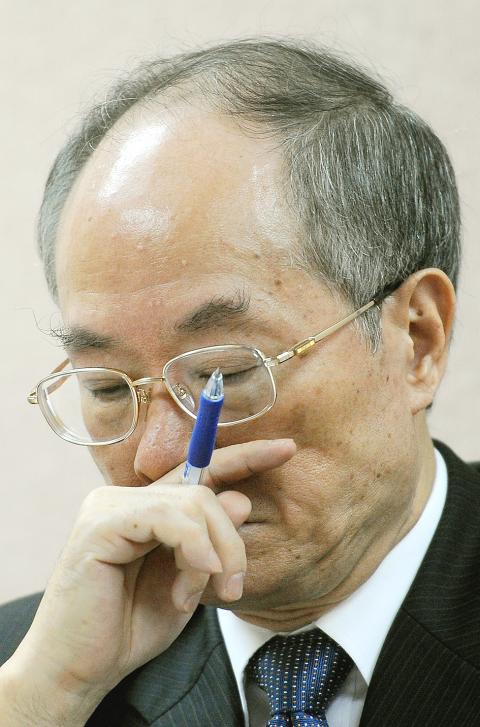Prosecutor-General Huang Shih-ming (黃世銘) yesterday apologized for what he said was the Special Investigation Division (SID) of the Supreme Prosecutors’ Office’s negligence in mistakenly wiretapping the legislature’s switchboard for a month.
Huang made the remarks at a meeting of the legislature’s Judiciary and Organic Laws and Statutes Committee, which referred a draft amendment aimed at abolishing the SID to cross-party negotiations
The committee had invited Huang and Minister of Justice Lo Ying-shay (羅瑩雪) to answer questions about the wiretapping controversy at a meeting called to review the draft amendment seeking to remove Article 63-1 from the Organic Act of Court Organization (法院組織法).

Photo: Liu Hsin-de, Taipei Times
The article provides the legal foundation for the SID’s establishment and investigative powers.
While fielding questions from Chinese Nationalist Party (KMT) Legislator Liao Cheng-ching (廖正井) — who accused the SID of being sloppy in its preparatory work, failing to follow up on investigations and being indiscreet when commenting on cases — Huang admitted there had been “oversights” and said he had apologized shortly after discovering the mistakes.
Several Democratic Progressive Party (DPP) lawmakers also grilled Huang on his interactions with President Ma Ying-jeou (馬英九) regarding the SID’s probe into alleged improper lobbying by Legislative Speaker Wang Jin-pyng (王金平).
DDP Legislator Wu Ping-jui (吳秉叡) asked Huang whether it was the revelation on Sept. 28 that the division had wiretapped the legislature’s switchboard that made the president stop calling him.
“Every time there was a news report casting doubts on the legitimacy of the SID’s operations, Ma would call me and ask me to clarify the matters... I don’t know why he suddenly stopped calling me,” the prosecutor-general said.
Huang had said on Sept. 30 that Ma had called him several times since Sept. 6, the day when the SID presented the transcript of a wiretapped telephone conversation between Wang and DPP caucus whip Ker Chien-ming (柯建銘) at a press conference to back its accusations that Wang had improperly lobbied for Ker in a legal matter.
Huang has also said that he met with Ma twice before the Sept. 6 press conference to discuss the investigation, on Aug. 31 and Sept. 1.
At the meeting, Ker asked Lo whether the task force the ministry set up to look into the wiretapping had reached a conclusion that the SID’s surveillance of the switchboard was the result of an “unintentional administrative negligence,” as some media outlets have reported.
“I respect the task force’s authority to look into the matter ... and I don’t know about the details of its investigation,” Lo said, denying that the investigation has concluded.
Deputy Minister of Justice Chen Ming-tang (陳明堂) said that the task force’s report is due to be published no later than Thursday.
Meanwhile, members of several civic groups yesterday backed the proposal calling for the abolishment of the SID.
One of the members, Life Conservationist Association executive director Ho Tsung-hsun (何宗勳), said that more than 40 groups plan to launch a signature drive in the legislature next week, urging lawmakers across party lines to sign the motion to disband the division.
Taiwan Democracy Watch convener Hsu Wei-chun (徐偉群) said the existence of a unit like the SID was unnecessary, adding that many democratic countries instead assign senior prosecutors to district prosecutors’ offices to help handle serious or complicated cases.

SECURITY: As China is ‘reshaping’ Hong Kong’s population, Taiwan must raise the eligibility threshold for applications from Hong Kongers, Chiu Chui-cheng said When Hong Kong and Macau citizens apply for residency in Taiwan, it would be under a new category that includes a “national security observation period,” Mainland Affairs Council (MAC) Minister Chiu Chui-cheng (邱垂正) said yesterday. President William Lai (賴清德) on March 13 announced 17 strategies to counter China’s aggression toward Taiwan, including incorporating national security considerations into the review process for residency applications from Hong Kong and Macau citizens. The situation in Hong Kong is constantly changing, Chiu said to media yesterday on the sidelines of the Taipei Technology Run hosted by the Taipei Neihu Technology Park Development Association. With

CARROT AND STICK: While unrelenting in its military threats, China attracted nearly 40,000 Taiwanese to over 400 business events last year Nearly 40,000 Taiwanese last year joined industry events in China, such as conferences and trade fairs, supported by the Chinese government, a study showed yesterday, as Beijing ramps up a charm offensive toward Taipei alongside military pressure. China has long taken a carrot-and-stick approach to Taiwan, threatening it with the prospect of military action while reaching out to those it believes are amenable to Beijing’s point of view. Taiwanese security officials are wary of what they see as Beijing’s influence campaigns to sway public opinion after Taipei and Beijing gradually resumed travel links halted by the COVID-19 pandemic, but the scale of

A US Marine Corps regiment equipped with Naval Strike Missiles (NSM) is set to participate in the upcoming Balikatan 25 exercise in the Luzon Strait, marking the system’s first-ever deployment in the Philippines. US and Philippine officials have separately confirmed that the Navy Marine Expeditionary Ship Interdiction System (NMESIS) — the mobile launch platform for the Naval Strike Missile — would take part in the joint exercise. The missiles are being deployed to “a strategic first island chain chokepoint” in the waters between Taiwan proper and the Philippines, US-based Naval News reported. “The Luzon Strait and Bashi Channel represent a critical access

Pope Francis is be laid to rest on Saturday after lying in state for three days in St Peter’s Basilica, where the faithful are expected to flock to pay their respects to history’s first Latin American pontiff. The cardinals met yesterday in the Vatican’s synod hall to chart the next steps before a conclave begins to choose Francis’ successor, as condolences poured in from around the world. According to current norms, the conclave must begin between May 5 and 10. The cardinals set the funeral for Saturday at 10am in St Peter’s Square, to be celebrated by the dean of the College